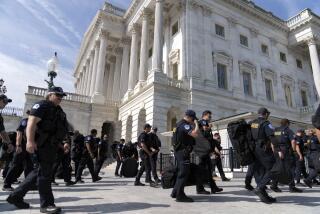Israeli Opposition Blasts Rabin Plan to Meet Arafat
- Share via
JERUSALEM — Already reeling from the pace of their country’s diplomatic rapprochement with the PLO, Israel’s political opposition Saturday condemned Prime Minister Yitzhak Rabin’s decision to join Yasser Arafat at Monday’s signing ceremony in Washington.
Likud leader Benjamin Netanyahu said the move effectively raises Arafat’s status to that of a head of state and called the agreement reached with the Palestine Liberation Organization a prescription for war.
“What will happen when they fire rockets into the Tel Aviv airport or Tel Aviv itself?” Netanyahu asked. “This is a great hoax being played on the Israeli people. I think this day, the day of the signing in Washington, will be recorded as a turning point in which the government of Israel . . . pulls back from its Zionist roots.”
Another leading opposition figure, Ariel Sharon, said the government should be trying Arafat as a war criminal, not embracing him in Washington. “No other man since Nazi times has so much civilian Jewish blood on his hands as Yasser Arafat,” he said.
Sharon’s remarks underscored the extent to which Israelis have come to see the PLO leader as a symbol of all they have fought against since the establishment of the state of Israel 45 years ago.
Late Saturday, it remained unclear whether Rabin and Arafat will be the ones actually signing the document committing the longtime bitter enemies to negotiate their differences peacefully. (Foreign Minister Shimon Peres, originally scheduled to sign for Israel, will accompany Rabin on the trip.) Still, the very idea that the two men may be shown on television greeting and talking to one another caps a series of stunning developments.
Interviewed on Israeli state radio, Deputy Foreign Minister Yossi Beilin referred to Arafat as “a very difficult symbol for us.”
Yet, incredulous Israelis found themselves discussing whether Rabin and Arafat will shake hands, kiss or do both.
In accepting President Clinton’s invitation to attend the signing ceremony, Rabin has effectively chosen to make one of the most sensitive diplomatic moves--actually meeting Arafat--while his opponents are still in disarray.
Like much of what he and Arafat have done in recent weeks, the tactic involves heavy risks. The prospect of a Rabin-Arafat meeting not only deepens the frustration of existing opponents of the agreement but could generate new resistance.
Some Israelis interviewed Saturday in Jerusalem, for example, expressed a feeling of betrayal, noting that as recently as two weeks ago, Rabin indicated strongly that he would not meet the PLO leader anytime soon.
“It’s going to make it harder to change attitudes toward Palestinians,” predicted Ofel Ophir, a hospital worker who said he favors the accord. “For many Israelis, Arafat is not a human being.”
Serge Benhaim, a Jerusalem dentist opposed to the agreement, was especially angry at the idea of Rabin meeting with Arafat.
“It hurts,” he said. “I’m afraid, very afraid.”
Trying to offset opposition rhetoric, members of Rabin’s government argued that pictures of Arafat greeting an Israeli prime minister would help bring home the enormity of the change now under way in the Middle East.
“It means that Israel is another Israel, ready to change many old ideas and adapt ourselves to a new reality,” Beilin said. “But then, the PLO is not the same PLO as before.”
News of Rabin’s decision came on a day during which tensions in Arab East Jerusalem and the occupied territories boiled over into sporadic violence as Palestinian opponents and backers of the agreement took to the streets.
The worst incident took place in Ramallah, 15 miles northwest of Jerusalem, where two Palestinians were killed and several others wounded when Israeli security forces reportedly fired on a group protesting the agreement.
Israel said the firing began after protesters hurled rocks and Molotov cocktails at border police.
In East Jerusalem, security forces fired tear gas to break up a large demonstration by supporters of the accord, who had ignored an order to disperse and hoisted a Palestinian flag atop the Damascus Gate entrance to the old walled city.
More to Read
Sign up for Essential California
The most important California stories and recommendations in your inbox every morning.
You may occasionally receive promotional content from the Los Angeles Times.













